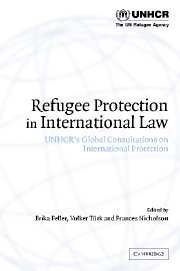Book contents
- Frontmatter
- Contents
- List of annexes
- Notes on contributors and editors
- Foreword
- Preface
- Acknowledgments
- Expert roundtables and topics under the ‘second track’ of the Global Consultations
- Table of cases
- Table of treaties and other international instruments
- List of abbreviations
- Part 1 Introduction
- Part 2 Non-refoulement (Article 33 of the 1951 Convention)
- Part 3 Illegal entry (Article 31)
- Part 4 Membership of a particular social group (Article 1A(2))
- Part 5 Gender-related persecution (Article 1A(2))
- Part 6 Internal protection/relocation/flight alternative
- Part 7 Exclusion (Article 1F)
- Part 8 Cessation (Article 1C)
- Part 9 Family unity (Final Act, 1951 UN Conference)
- 9.1 Family unity and refugee protection
- 9.2 Summary Conclusions: family unity, expert roundtable, Geneva, November 2001
- 9.3 List of participants
- Part 10 Supervisory responsibility (Article 35)
- Index
9.1 - Family unity and refugee protection
Published online by Cambridge University Press: 28 August 2009
- Frontmatter
- Contents
- List of annexes
- Notes on contributors and editors
- Foreword
- Preface
- Acknowledgments
- Expert roundtables and topics under the ‘second track’ of the Global Consultations
- Table of cases
- Table of treaties and other international instruments
- List of abbreviations
- Part 1 Introduction
- Part 2 Non-refoulement (Article 33 of the 1951 Convention)
- Part 3 Illegal entry (Article 31)
- Part 4 Membership of a particular social group (Article 1A(2))
- Part 5 Gender-related persecution (Article 1A(2))
- Part 6 Internal protection/relocation/flight alternative
- Part 7 Exclusion (Article 1F)
- Part 8 Cessation (Article 1C)
- Part 9 Family unity (Final Act, 1951 UN Conference)
- 9.1 Family unity and refugee protection
- 9.2 Summary Conclusions: family unity, expert roundtable, Geneva, November 2001
- 9.3 List of participants
- Part 10 Supervisory responsibility (Article 35)
- Index
Summary
Introduction
The family is universally recognized as the fundamental group unit of society and as entitled to protection and assistance from society and the State. The right to family life is recognized in universal and regional as well as in many national legal instruments. The right to family unity is inherent in the right to family life. This right applies to all human beings, regardless of their status.
Few human rights instruments, however, are explicit about how and where this right is to be effected in relation to families that have been separated across international borders. For refugees and those who seek to protect them, the right to family unity implies a right to family reunification in a country of asylum, because refugees cannot safely return to their countries of origin in order to enjoy the right to family life there. The integrity of the refugee family is both a legal right and a humanitarian principle; it is also an essential framework of protection and a key to the success of durable solutions for refugees that can restore to them something approximating a normal life.
Refugees run multiple risks in the process of fleeing from persecution, one of which is the very real risk of separation from their families. For individuals who, as refugees, are without the protection of their own countries, the loss of contact with family members may disrupt their major remaining source of protection and care or, equally distressing, put out of reach those for whose protection a refugee feels most deeply responsible.
- Type
- Chapter
- Information
- Refugee Protection in International LawUNHCR's Global Consultations on International Protection, pp. 555 - 603Publisher: Cambridge University PressPrint publication year: 2003
- 10
- Cited by



